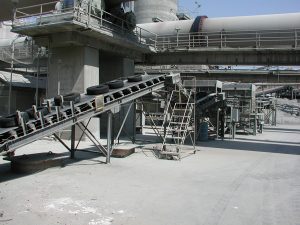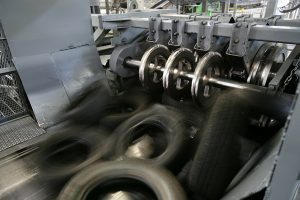In the last couple of decades, the tire recycling industry has grown by leaps and bounds. Not only is this good news for those wishing to be rid of tires, it’s also good news for the environment. Properly disposing of your tires is not just important—it’s critical.
By Paul Arellano
Improper or poor tire disposal can create a myriad of health and safety problems. Fires have erupted in tire piles, lasting for weeks or months at a time and releasing chemicals into the air and ground. Millions of tax dollars have been spent putting out these fires and cleaning up afterwards. Tire dumps often become breeding grounds for vermin and mosquitoes, which can carry diseases. The illegal dumping of tires pollutes streams, woods, roadsides and other public land.
Fortunately, in the last couple of decades, the tire recycling industry has grown by leaps and bounds. Not only is this good news for those wishing to be rid of tires, it’s also good news for the environment, which is why properly disposing of your tires is not just important—it’s critical.
Myths About Tire Recycling
There are common misconceptions about tire recycling that may discourage consumers from properly recycling their tires, such as cost and time. Tire recycling has some unique differences compared to how other items are recycled, making it easy and affordable.
Myth: Tire recycling is time consuming.
Fact: It’s absolutely true that recycling tires takes time, and so does reading a good book! The truth of the matter is that tires are recycled at the same time that a consumer buys another set of tires, new or used. This is not “time consuming” in the traditional sense since the customers’ tires must be removed in order for another set to be installed, so there is really no more time involved. If you are not changing tires on your car and happen to have some old tires on your property, you’ll need to locate and identify a proper drop point, where your tires can be properly recycled. A bit of online research can make things easier and less time consuming. Plus, it makes for a cleaner, greener planet.
Myth: Tire recycling is messy.
Fact: Unlike bottles and cans, tires are generally not taken to “recycling centers.” From time to time, communities will have clean up days, and sometimes, tires are collected with batteries, computers and other items. There are some recycling companies that accept tires from the public, but consumers dropping off tires at recycling centers is not how the majority of tires are recycled. However, if you do drop off at recycling centers, some require your tires to be clean when they arrive, but not all of them. This means washing off mud, dirt and debris before dropping them off or having them picked up. Simply by doing your homework and finding companies who will collect your tires “as is” can save you from the messiness.
Myth: Tire recycling is costly.
Fact: While there are some nominal fees to tire recycling, think about this: what would it cost if you got caught improperly disposing of tires? Fines, fees and costs could wind up being significantly higher. What about the “costs” to the environment? There is likely no real dollar amount that you could place on that, would you agree? Recycling fees are generally not “costly”. They can vary from state-to-state and store-to-store, but the range is usually $1 to $2.50 per tire, a fraction of the cost of what consumers pay for replacement tires, even used tires.
When tires are not discarded of correctly, they create pollution. While there are misconceptions that tire disposal is too time consuming and costly, there are actually numerous benefits to getting rid of tires correctly. Recycling creates jobs, which helps the economy. Also, if you run a company, like a trucking fleet operation, recycling your tires can appeal to environmentally conscious consumers.
The Positive Uses and Benefits of Recycled Tires
There are a variety of innovative uses for scrap tires. Scrap tire material has actually become a valuable resource, across many different industries:
Fuel—Whole and reduced-size scrap tires are burned for fuel that is used to power cement kilns, pulp and paper mills. Tires actually burn hotter and cleaner than coal, so by replacing coal, tires help reduce emissions.
Construction Materials—The majority of states in the U.S. use scrap tires for roads and various civil engineering initiatives. Scrap rubber is inexpensive and useful as fill under roads where clay or other weak soils can be problematic. Shredded scrap tires are also useful in sound walls, bridge foundations and landfill construction.
Crumb Rubber—Crumb rubber is finely ground rubber produced from waste tires. Steel and tire cords are removed from discarded tires, and the remaining rubber is reduced to a granular consistency. These granules can be formed into a variety of products, including: vehicle mud guards, floor tiles, speed bumps and anti-fatigue mats.
Remolded Tires—Scrap tires that meet certain criteria can also be remolded with new treads and sidewalls, to create a cost-saving alternative to new tires. When properly manufactured, remolded tires can withstand the rigors of daily use, and many carry warranties similar to those of new tires.
Do Your Part to Make Sure that Your Tires are Recycled Properly
Many states require that new tire retailers charge a fee that is used to cover the cost of properly recycling scrap tires. Part of these fees are paid to professional tire recycling companies that contract with retailers to pick up their waste tires on a regular basis. These tires are taken to a local processing facility, where their journey to new life as a recycled product begins.
It is not uncommon for a customer to refuse the fee and ask that the tires be put in his or her trunk, to use “as a backup.” Oftentimes, these tires will end up sitting in a garage, or worse, a backyard, exposed to the elements and to insects or other critters. These tires quickly become a nuisance, and the risk of them being dumped illegally, increases. The damage to the environment can far exceed the small cost of properly recycling the tires at the retail level.
Do the right thing for the environment, for your community and our future: have your waste tires properly recycled. The fee that you pay at your local tire store is not a tax, but it does ensure that your waste tires are handled properly and recycled. | WA
Paul Arellano is the Sales and Marketing Manager at Lakin Tire (Santa Fe Springs, CA), a tire recycling company that was founded in 1918. Lakin Tire is giving new life to old tires through creative thinking, innovative recycling processes and optimized scrap-tire management. For more information, call 562-802-2752, e-mail [email protected] or visit www.lakintire.com.


